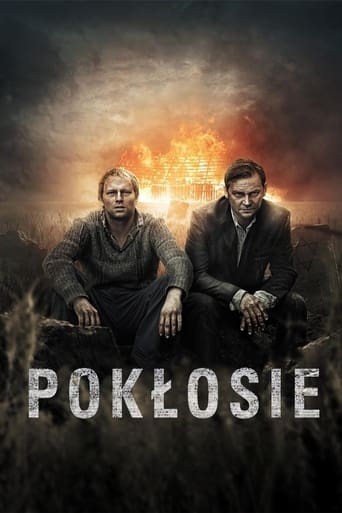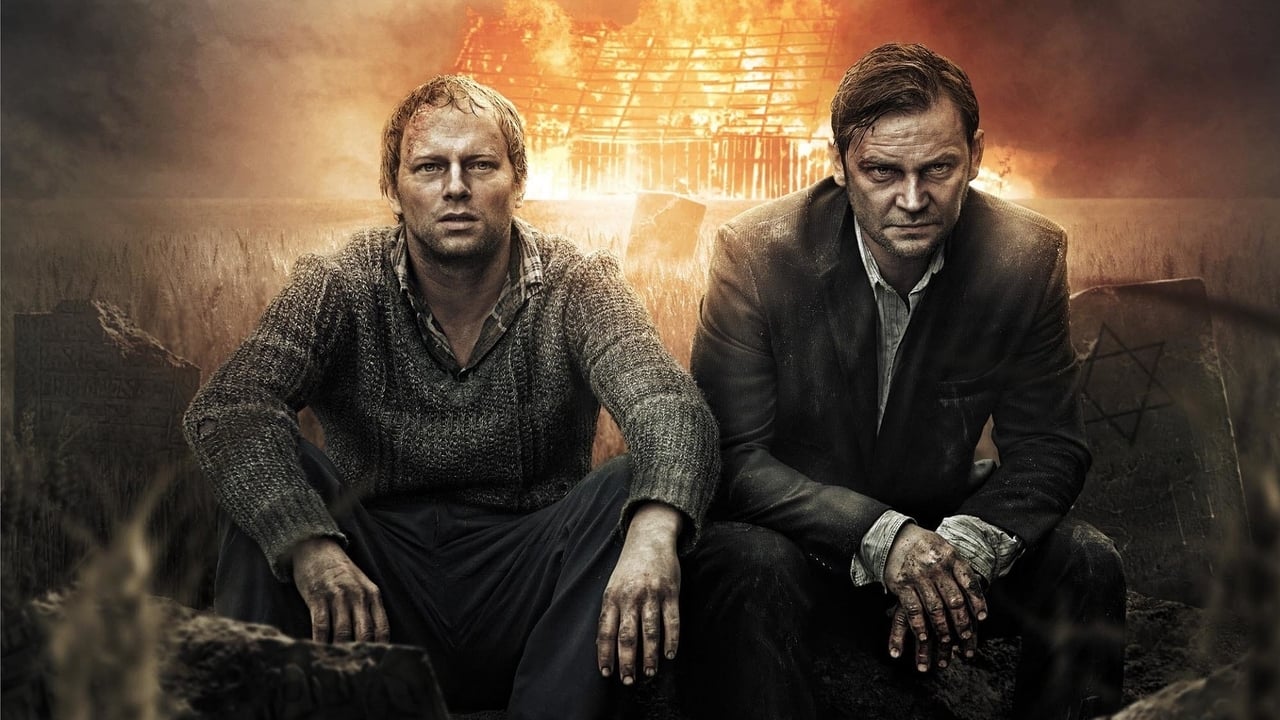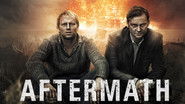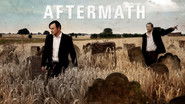Paul Allaer
"Aftermath" (2012 release from Poland: 2014 DVD release in the US; 107 min.) brings the fictional story of the aftermath of WWII in a rural village in Poland. As the movie opens, we see Francis Kalina landing at Warsaw's airport. We later learn that he basically left/fled Poland for the US when General Jaruzelski declared martial law in 1981 and that this is his first time back in 20 years (thus setting the movie in the early '00s). Francis comes to visit his younger brother Jozef who runs a small farm. It's not long before we notice that the villagers seem to despise Jozef. We then learn that Jozef has taken a personal interest in restoring tomb stones of local Jews who were murdered by the Germans in WWII, and Jozef is recreating a cemetery on his farm one by one with the tomb stones he recovers. Meanwhile, in a parallel story, things seem askew with the property title of Jozef's farm. To tell you more about this plot-heavy movie would spoil your viewing experience, you'll just have to see for yourself how it all plays out.Couple of comments: I saw this movie recently at a film festival (more on that later). I had never heard of the movie, and didn't know anything about it or the plot going in. I was surprised how long it took for the true story lines to emerge. When Jozef, the younger brother, is assaulted in a café a good 30-40 min. into the movie for no apparent reason, I made the mental note... "why?". The story line involving the property titles is developed even later, about an hour into the movie. Frankly, by then I was about to give up on the movie. I decided to hang in there, and yes, the last 30-40 min. redeem the movie to a degree. Perhaps one of the reasons that I had trouble connecting is that I was not all that impressed with the acting performances, I mean, you truly watch them "act" when in a film you shouldn't feel as if you are watching "acting", you know what I mean? All that aside, the historic background and ulterior intentions of the movie can never be in doubt, and just from that angle, this is something people should watch.I recently saw "Aftermath" at the 2015 Jewish & Israeli Film Festival here in Cincinnati. The screening was sold out, but more importantly, the organizers have assembled a top-notch quality line-up of movies such as The Green Prince, Dancing in Jaffa, and The Third Half, just to name those. As a movie buff and a support of the Israeli cause, I absolutely love this festival. As to "Aftermath", the movie is well-intended but takes forever to establish, so I'm giving it a mixed 3.5 stars: not bad but not great either.
FilmCriticLalitRao
It is said that history cannot be buried under the ground. It always comes out of its own accord in the future to talk about the past. This is something which viewers witness in "Aftermath" which has been set as a fast paced thriller. The story is told through the turbulent lives of two brothers Franek and Jozek who experience how their peaceful life in a small polish village is completely transformed once they come across some horrible secrets involving murders of their Jewish neighbors during second world war. Pasikowski's film succeeds from the beginning as it fights against a lot of clichés. Firstly, it is absolutely harsh against the belief that let the secrets remained buried as it would be in the interest of everybody if their currently status quo is maintained and not disturbed in future. This is not something which Kalina brothers are willing to accept readily as it was not on their minds to let the secrets be buried. They were fully aware of consequences they would have to face if they went ahead with their scheme of unearthing secrets. In this manner, Kalina brothers-Franek and Jozef make it explicitly clear that truth must come out regardless of the anguish and pain it might cause to anybody who is not able to digest it. Although the villagers are not shown in a negative light but director Pasikowski is upright when he shows that there is a lot of resentment in the minds of local people about its inhabitants who have left for USA. The role of church as depicted in this film is rather ambiguous as the local priest chose to remain neutral at a time when a lot could have been done by him to assuage sufferings. The religious angle gets prominence when the younger brother sacrifices himself in the same manner as Jesus Christ to atone for sins committed by his father. It is rather unfortunate that upon its release in Poland, Aftermath was embroiled into unnecessary controversy. One fail to understand what led some Polish people to accuse this film of being an anti Polish propaganda. Lastly, as freedom of expression is needed to understand the greatness of all works of art, it is hoped that the ban on "Aftermath" in some Polish cinemas would soon be lifted.
seeitconsultancy
Aftermath tells the story of Franek, pulled back to his native Polish roots from Chicago after thirty years, to see his brother Jozek, who lives on the family farm outside Warsaw. They are both experiencing some kind of aftermath - Franek fled Poland years before and is teased for coming back home, while Jozek's wife and kids have inexplicably left him and he's the most hated man in town. When Franek finds out Jozek (Maciej Stuhr) has inexplicably ripped up a thoroughfare road surface nearby he must unravel the mystery - leading to a discovery that breaks open all they know about their family and the town around them.The film has a strong storyline related to World War II and the slaughter of Polish Jews, which has been controversial in its home country.This unique gritty thriller is bound to true-life events, and so emotive that it's easy to see why the reaction might have been so strong from a country where religion still plays such a huge part in all aspects of life.Performances are tight, measured and well-rounded. Actors breathe life into the script in every corner with even cameo players adding to a dark and lustrous community of characters within the film's grim premise - The human drive for survival in exceptional circumstances as violent, greedy and barbaric fuels performances with meaty and violent lines in even the oldest actors here.Wladyslaw Pasikowski, the director, stuns from the first minute, narrating with simple and blunt motif from the off: We see Franek (Ireneusz Czop) arriving in Warsaw at the start of the film; his eye twitches just once as he irritatedly hands over his passport. It's lean storytelling that keeps you guessing to a sad and horrifying end.Exquisitely shot and colored, with images of Polish landscape like paintings that wash you in the atmosphere of 80's Eastern Europe - maybe Franek feels nothing has changed since he left thirty years ago - "Hasn't changed a bit." he says, entering Jozek's house. It's no surprise that Polanski's cinematographer on The Pianist, Pawel Edelman is at work as the DoP here.Something about this movie reminded me of Almodovar's The Skin I Live in or Arcel's Dragon Tattoo, or maybe Music Box. The way the characters build, and the tension in silence, and also the absolutely native way the tradition, political situation and historical culture of Poland is presented. The back story is crafted brilliantly - Poland becomes a whole character in itself, with a personality, mood and motivation - and not always in a good way. Poland has its dark underbelly.This is where the genius of this script lies. To someone who knows nothing of Poland's rich interior tapestry and relationships with the outside world, this film enlightens and interests succinctly without a history lesson, with an engrossing soundtrack from Jan Duszyński, (reminiscent of another Polish composer Zbigniew Preisner with his work on Three Colors).In fact the criticism lies only in the way the subtitles have been produced. They are one beat behind all the time - I would like to see the subtitle when the character speaks, not half a second after, and there are some spelling mistakes in them: here/hear, drom/from, your/you're, maybe/mebbe, for example, and odd words like " vacationers" and "a 100 years" used in a sort of non-native way. Some sentences are not proof read and are missing words, "your brother didn't back.."(?) This did spoil my enjoyment of the film occasionally.This script is ripe for an American remake, but it's pretty likely this Polish original will remain superior. A tense and intelligent haunting of a film absolutely recommended - an outstanding European seat-sticker.
turkucniejadek3
Good Day, I registered to IMDb for the first time, just for this title... This is very important moment of polish history and very important movie to understand this history. I must confess first that I'm from family very close connected to connected to WWII Underground Home Army in Warsaw. Is someone has something to say about ghettos in Warsaw and Nazi occupation, my family was part of it from creating opposition to lost life in Auschwitz. My uncle died in Auschwitz for being family of important man before 1939. He was 16 years old boy. Pole, not Jew. Whole my family was destined to die in Auschwitz, but managed to avoid it, except my young uncle... Back to movie. My family was in Warsaw, was in underground and... was helping Jews in Ghetto and I also have Jew family (and proud of it). It was very hard to believe that Jedwabne and similar facts happened, especially for my grand dad, but... Even thought he was victim of denunciation, he was also victim of small peasant communities; like Jedwabne. He had to pay to not be arrested by Gestapo and he had to pay with family precious relics and everything he had. Just because peasants knew who he was. And he had to eat. Probably we will never know how many people died because of mentality of people like in "Poklosie"... Creators of "Poklosie" including actors are "enemy of the state", but many people still remember who made money for deaths. Yes, I know, it's short and not important comment, but if you know how less popular version of polish history looked like - watch the movie. No, it was not always like this - this is why most Israelis has polish roots, but we should remember of German, French, Dutch, French, Russian and other people who helped Nazis just for money.No comment. you just have to see this movie, no matter what you think. With Kind Regards, B. Radziszewski


 AD
AD





